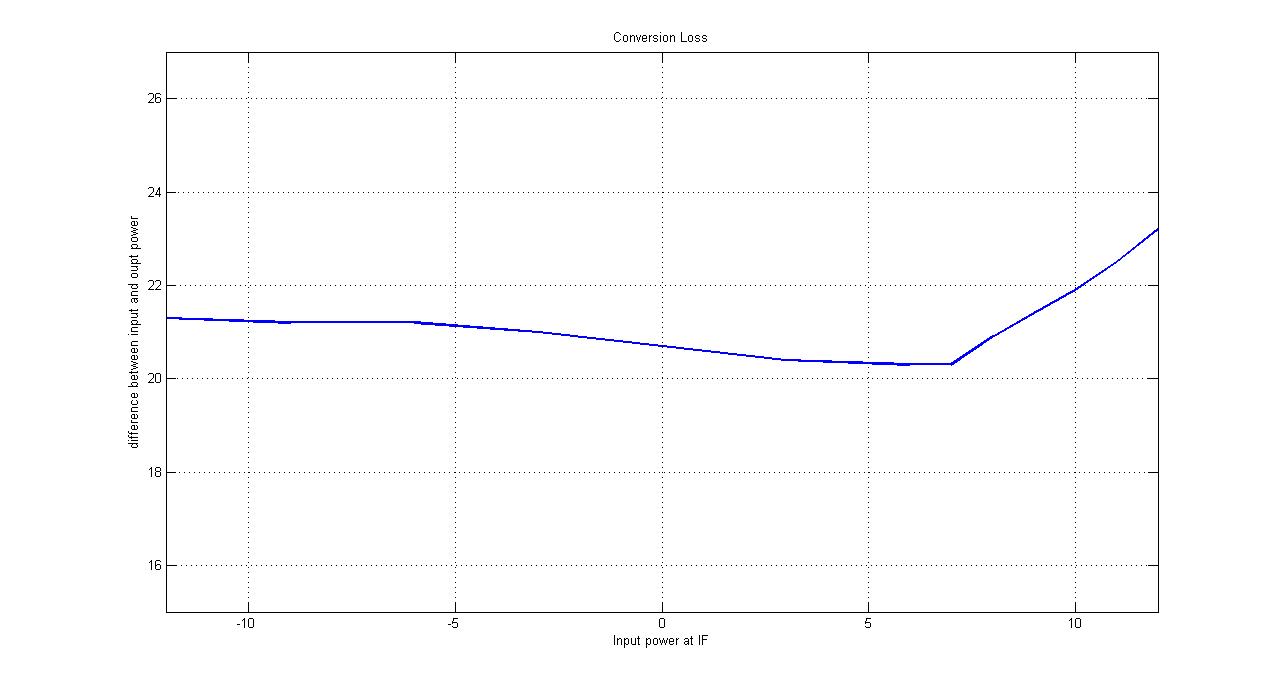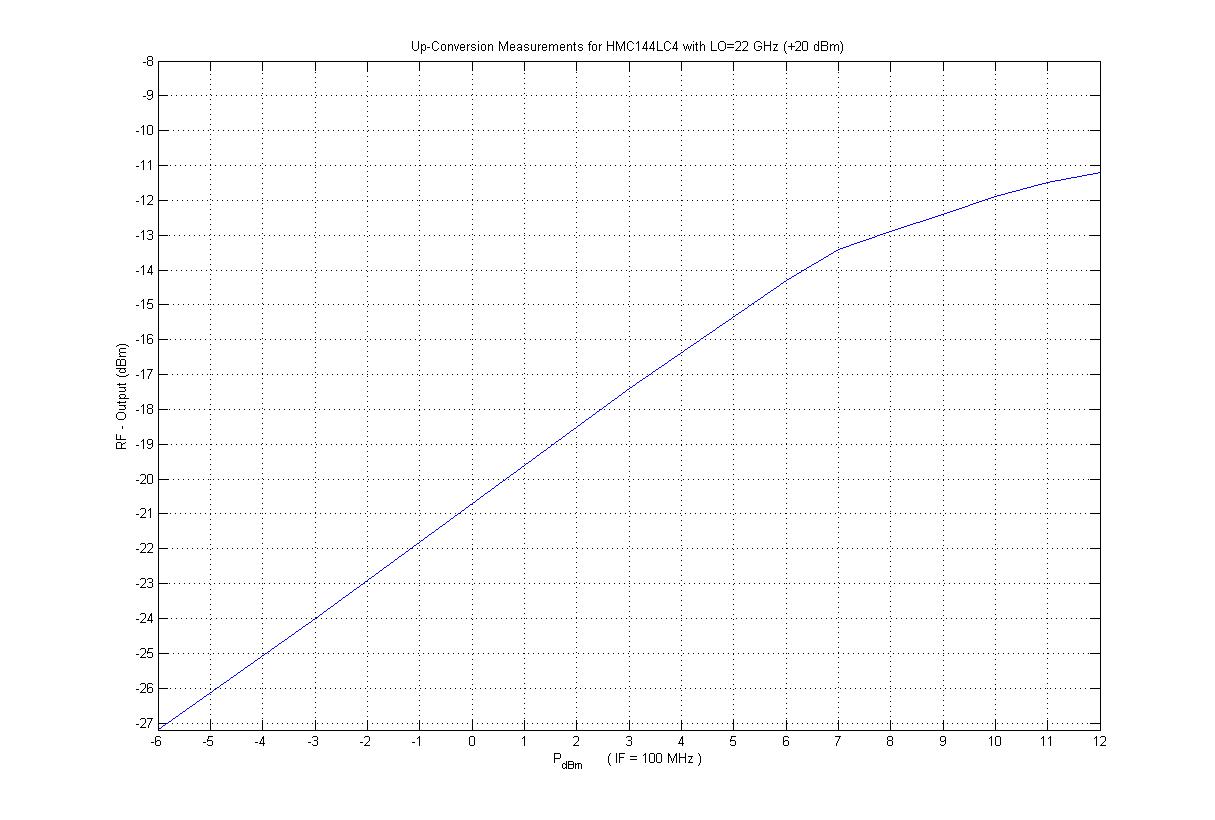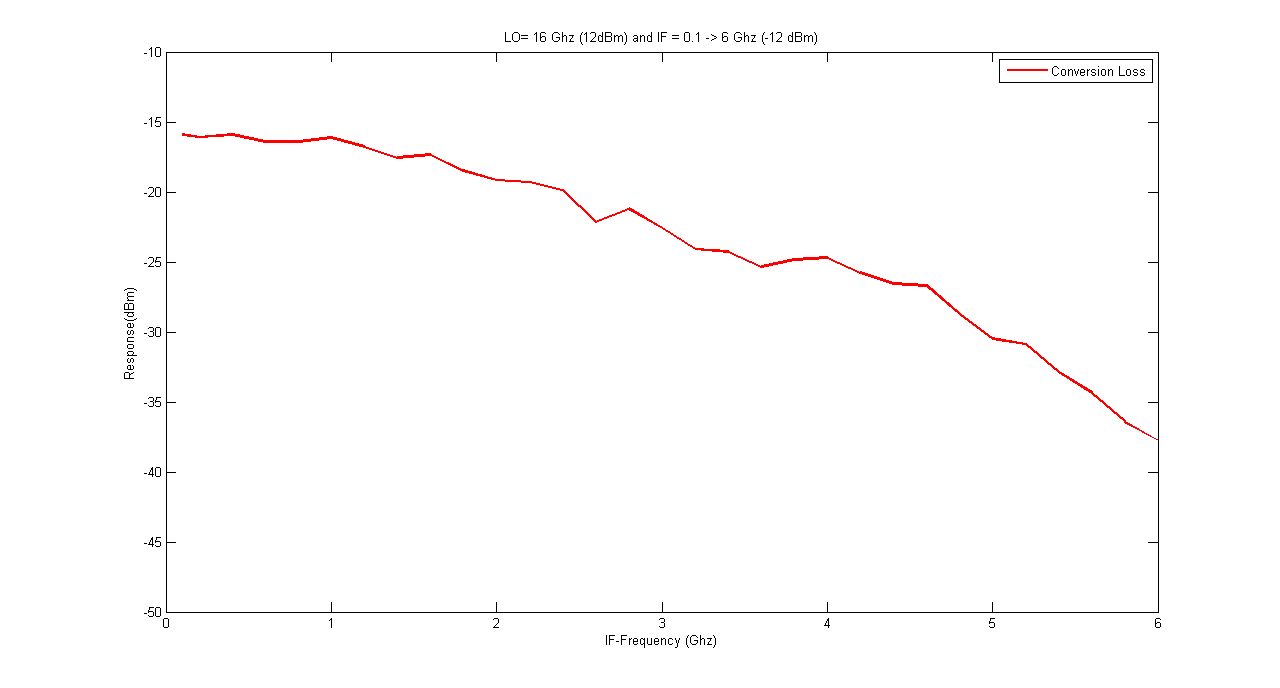measuring conversion loss of a mixer?
about conversion loss, it is clear that it's the difference b/w input and ouput power levels.
I tried to measure it in lab and did the setup like, I fixed the frequency of both LO and Input and measured the ouput power and draw this plot...

LO= 22 Ghz with +20dBm
IF = 100 Mhz and variable power level
and I correct in my thinking or am I doing it wrong?
Conversion Gain/Loss=RF Power/IF power(dBm)-IF Power/RFPower(dBm) @LO Power Fixed
You did right but +20dBm is probably is much for drive a active mixer.But I don't know your exact drive conditions.
I did my measurements for this device
http://www.hittite.com/content/docum.../hmc144lc4.pdf
and here is the input vs output power

let say at given LO, my input is -4 dbm and my output at spectrum analyzer is -25 dbm, then what could be calculated conversion loss (I am confused bcoz these value of signal generator and spectrum analyzer are already in dBm)
You think true, but
1. make sure about LO Power. it must be greater than +17dBm
2. test conversion gain at a frequency in 6-20Ghz band. this is the guaranteed region of mixer.
3. if the results of step 2 is different from datasheet, check your setup.
As you test the mixer as an upconverter, I think a RF band-pass filter must be used, to reject the unwanted sideband.
If the Hittite mixer is the double-balanced type, it should work without it. IF input of 100 MHz at 20 GHz LO generates a RF output of 20.000 +/- 100 MHz, so the conversion gain must be measured with a narrow-band receiver or a spectrum analyzer, to exclude the LO high power at RF output.
Check Hittite data sheet and test procedure.
by 6 - 20 GHz u mean the input (IF) or the output (RF). I mean to say that shall I keep the LO and IF power level constant and change only the frequency level of IF to check the RF frequency range, or shall I keep even the IF frequency fix and change only IF frequency level..
sorry but I am not getting this point...
- - - Updated - - -
yes the mixer is double balanced and all measurements are done with signal generator and spectrum analyzer... but isn't it easy to do it with Network analyzer (I think if yes then that would save me alot of time, instead of calculating each change in small steps for frequency and power level, write it donwn and move fwd repeat the same thing.)
VEctor network analyzer can only be used with a calibrated reference mixer, to keep the test frequency.
As you apparently have no experience with mixer testing, find Agilent white papers, there is one for mixer testing.
I have read somewhere that normally conversion loss varies between 3 to 9 dB but the wide band mixers have higher conversion losses, what could be the reason for that and how much is the acceptable amount of conversion loss for a wideband double balanced mixer...
There are many types of balanced mixers on the market. For the best at 18 to 110 GHz, check "www.spaceklabs.com", you can see their specifications. Below 40 GHz, "www.marki.com" offers the best mixers.
Conversion loss is >6 dB typ., the 3 dB you mentioned can be achieved in upconverters with a careful phasing of the output RF filter, over a narrow band.
MMIC mixers are now good but the "old-style" waveguide mixers offer the best conversion loss.
what I actually thought was this 3 to 9 db defines the acceptable range of conversion loss. for example have a look at this pic

this is measured data of one of the mixer i am using for upconversion from hittite corp. conversion losses are lower then -15 dB,
In my thinking, as at lower frequencies the CL is near -15 dB, so the acceptable range is -15-9= -24 db which is roughly around 3.5 Ghz, from which we can say the IF bandwith of this mixer is DC-3.5 Ghz...
am i right or am i getting it wrong...
I do not know what mixer was measured but if the Y is conversion loss, it is a quite poor mixer.
Good mixers have 6...8 dB typ. over the nominal RF range. For very wide bandwidths, up to 10 dB may be tolerated.
Most mixers need enough LO input to perform well. There are also DC-biased mixers to save on LO power.
http://www.hittite.com/content/docum.../hmc144lc4.pdf
conversion loss of this mixer as per it's data sheet are 10-13 dB, can we relate the extra losses to transmission line losses or pcb housing effect. also i was thinking that I have used SMA connectors whose cut-off frequency is lower then 18 Ghz, are these thing effecting the conversion losses?
The trace loss and SMA loss are on the 0.1dB level, so you can ignore it.
